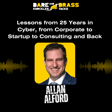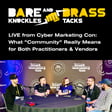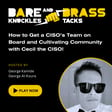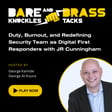Become a Creator today!Start creating today - Share your story with the world!
Start for free
00:00:00
00:00:01

From 1.6 GPA to Global Cyber Leader, How to Tell the Story of Your Skills with Andrew Owlett
Andrew Owlett joins the show to talk about what actually matters in cybersecurity career development (hint: it's not your GPA)!
George K and George A talk to Andrew about:
- Why "failing" early in his career shaped his approach to leadership
- The problem with cyber's culture of shame and how to build confidence
- What cross-functional skills ACTUALLY look like (and how you probably already have them)
- Truth about work-life balance and corporate "family"
Plus we dive into real advice for career transitions, building authentic relationships, and how to craft your story.
No buzzwords, no BS - just practical insights from someone who's lived it.
————
👊⚡️BECOME A SHOW SUPPORTER
https://ko-fi.com/bareknucklesbrasstacks
For as little as $1 a month, you can support the show and get exclusive member benefits, or send a one-time gift!
Your contribution covers our hosting fees, helps us make cool events and swag, and it lets us know that what we're doing is of value to you.
We appreciate you!
Transcript
Overcoming the 'No Value' Mindset
00:00:00
Speaker
I would say the first thing folks need to do is understand that even if you think you provide no value, you provide a lot of value. So stop, get that out of your head. Like I had that in my head all of the time. Like when I was going through college and almost failing out 1.6 GPA, and I'm actually proud of that today, by the way, like it's a really weird thing to say, like this year, my identity is near college dropout, just turning myself the fuck around and getting my head out of my ass and saying, hey, you're about to be a failure and right now you need to not be a failure and you need to get this degree right now to get to the next stage and everything. You need to get that internship to get the experience. You need to start meeting people and learning how to talk to people. So that was the kick in the ass that really shaped me.
Introducing Andrew Owlett
00:01:00
Speaker
It's Bare Knuckles and Brass Tax. This is the cybersecurity podcast that tackles all the messy human bits on the side of the industry, trust, respect, and all the rest. I'm George Kay with the vendor side. And I'm George A, a chief information security officer. And today our guest is Andrew Owlett, a global cybersecurity leader in supply chain, both physical and cyber, also former firefighter, disaster management, career consultant, genuinely good dude.
00:01:30
Speaker
Yeah, let's really focus on that genuinely good dude part because I think what we get with Andrew is you have someone who has done a lot of the hard things, learned a lot of the hard lessons, failed more times than he's willing to counter or admit.
00:01:45
Speaker
ah Though he is very, very um unabashed about the fact that, you know, he'll call himself a fuck up. But he is definitely the kind of person you want to get to know.
Redefining Career Narratives
00:01:54
Speaker
He really brought a lot of great insight to our show, talked a lot about overcoming a lot of challenges, a lot of a lot of personal challenges and and really fighting through that negative voice in your own head. And I think anyone, anyone listening to this episode is going to be inspired by the mental resilience Andrew really puts on display for us.
00:02:13
Speaker
Yeah, it's all about how to tell your story. And in fact, on a personal note, the man helped both myself and me talk about ourselves when the time in my case came for layoffs and how to position myself for nuclear it actually gave me an entirely new way to talk about my skillset and what I wanted to do. It's quite amazing. So enough of us, you should get to meet Andrew too. I'll turn it over to him. Andrew Owlett, welcome to the show.
00:02:42
Speaker
Happy to be here. Thanks for the opportunity. Absolutely. So you are on the practitioner side, which means I get first crack.
Unconventional Paths into Cybersecurity
00:02:51
Speaker
So I am going to start with a very light topic, which is the airing of grievances around hiring in cyber. And the reason I want to bring that up.
00:03:04
Speaker
is because you have a very unconventional background. And I think you've written very publicly about what that was like in that journey. And so given how you got into cyber and excelled into a leadership role, just want to give you the space to talk about what you think is going right or wrong in how we are pulling in the next generation, because as anyone can attest who has seen us in person, none of us are getting any younger. And so we got to bring in the next line of defenders.
00:03:34
Speaker
Yeah, and I feel like every day my muscles are aching more and more, especially my lower back, and it's probably from sitting in a chair more than I want to. but um So i think I think one of the biggest things that that really, really um bothers me. And in this, the cyberspace is that a lot of people say, hey, I'm super accepting of taking on people of mentoring and supporting them. But when it comes down to actual execution on that, it's, it's, um,
00:04:08
Speaker
It's very difficult for um like people trying to get in the space to to have somebody that has the time to mentor, support them, and allow them to open up and ask any questions.
Barriers in Cybersecurity Culture
00:04:21
Speaker
um it It was a pretty big barrier for me because I didn't know the language, so I automatically felt like I was an outcast. um And it shouldn't be that way.
00:04:31
Speaker
like I mean people all the time as in in cyber or physical security like people don't understand the language all the time like as as a. um like input into cyber and physical security. Like you're not dealing with people that are technical that understand the intricacies. So you have to like talk to them like normal people. So why can't these people that are in space get in and talk like a normal person? Like it just seems a little bit backwards. It's like a really insular culture that kind of like excludes, even though I don't think that's the intention, but it does.
00:05:03
Speaker
Yeah, and I mean, that's just that's just my take. um And some of the things that I've heard from folks. um And then on the other flip side, I mean, I think think a lot of times people don't necessarily know what path they want to take. And like that kind of goes to like coaching, mentorship,
Experimentation and Resistance in Roles
00:05:21
Speaker
and support. like There's a lot of different areas within security. like There's just an immense amount of like paths that somebody can take.
00:05:30
Speaker
um And like just finding out what you like and what you don't like and experimenting on the job and through extracurricular projects, um I think think is what eventually helped me out. But not everybody's accepting about that. A lot of people are like, no, you've got to focus on your one job. You can't do extra things. And like for me, like those extra things are what carried me. It allowed me to you know spark my curiosity and like find out what I like and what I don't like. So that's another like
00:06:00
Speaker
part that kind of bothers a little bit. Andrew, it's good to finally talk to you. I'm really excited that we can actually do this. um And thank you, by the way, for all your personal help, ah for my career questions that you have been a wonderful friend for. So for people listening on the show, Andrew is awesome. He's a good guy. He puts his money where his mouth is. I do have to counter you on two points that you just raised, though. On the first thing, it's not necessarily the leader's fault. um We've been living in the era of tech cuts for the last like three years.
00:06:32
Speaker
I can tell you from personal experience, I have hired and spent years developing people only to have to lay them off. the and sucks it's It's a thing. And then the other thing too is um you're talking about your second point of just like the the language and and the gatekeeping. um I think it's also important that folks need to, folks need to temper their expectations. Cause like a lot of people see some of the salary numbers in the industry and then they go do a bootcamp and they pay somebody like 12 or $15,000 or something for like a nine week thing. And they're like, where's my $300,000 job? the that's the way ago go We are not fans of the parasitic bootcamp economy, this this the traveling medicine show, hawking snake oil.
00:07:21
Speaker
yeah yeah yeah sorry yeah though ah George and I rant about this like all day offline, um but I just wanted to raise those two points because for the sake of defending practitioners, they're there are other factors to it. They aren't just all dicks, even though b most CISOs are.
00:07:39
Speaker
George, you knowt first off, ah you know it was rude of me not to say this. It's awesome to be talking to both of you like in person. i mean We text so much and engage so much that it's about damn time. but um you know, I agree with what you just said, you know, I'm not trying to, and i I may not always agree, you know, like, that's why we have these discussions, right? Like, it's okay to not agree. um It's okay to voice that and, you know, everything, but I actually, something sparked in my head that, you know, on the practitioner side, like one of the things that, you know, people only have so much time, you know, at the end of the day, you know, people have demanding jobs that are demanding two or three jobs worth of like work from them on a day.
00:08:23
Speaker
um And then people have families. People have well-being. You have to focus on your well-being. You don't want to push that to the side, but oftentimes you know it does because you only have so many hours. so um And then you have mentoring and coaching and supporting, and like that's just another thing to add to it. so my thing is like then like what's the solution, right? like how how do you How do you solution around allowing people to have that chance and like making it scalable, like time efficient wise? Is it like speed dating? Where you know you five minutes you get to spend with somebody and you just get one question in? Or is it something else? I don't know. I don't
Translating Skills from Non-Cyber Experiences
00:09:07
Speaker
know. It's a good point you just raised though.
00:09:10
Speaker
Yeah, and I mean, look, at day's end, like we're just trying to talk about how do we make things better for folks. So it's a really good perspective you're bringing. And it wouldn't be a conversation between two CEOs if we didn't disagree about something. So bro, bless you. I absolutely appreciate you being here. um Actual question, though. How do you translate non-cyber lived and working experience into marketable security skills?
00:09:34
Speaker
So i'll I'll answer that by saying like one of my strengths is building relationships with people and then learning about what they do. and um i think I think one of the things that I i used to be really scared of was was asking like the most basic questions, and now I find myself asking those basic questions every single freaking day. um So I would say that like between like technical and non-technical, the biggest thing is like getting in the room with somebody, like asking the simplest questions, and then translating that into something that's relatable to you, like an experience from another and they're um
00:10:14
Speaker
Part of your work life party your life and everything and like i was used stupid analogies in my head to translate like some of the most complex things in the something that's super easily digestible that's a strength of mine to strengthen my because oftentimes the people i talk to.
00:10:29
Speaker
They don't freaking care about the ins and outs and the technicalities and like all this other
Veterans Transitioning to Civilian Jobs
00:10:34
Speaker
crap, you know, like they just want to know, um, like, what's my risk? Like, tell me, and then tell me how to fix it or tell me how you're going to fix it or, you know, like all this other stuff. So and don't you dare say NIST CSF. oh No, no, that is not a solution.
00:10:51
Speaker
it's a pain so So anyway, I don't know if that hits on what you were asking, George. Yeah. And it hits perfectly because it's really just about, hey, because, you know, we just had ah a really cool Veterans Day panel and a big question that, you know, we were asked those guys like, hey, ah you guys did a bunch of cool shit for a bunch of years. How do do I translate this into a resume? Because I can say as a veteran and talking to four other veterans there earlier.
00:11:20
Speaker
um It's not really the most intuitive process to figure out how do you articulate what am I good at? Because you just think, but but I blew stuff up for 10 years and I don't know how that has anything to do with tech.
Building Confidence from Academic Failure
00:11:34
Speaker
yes it Andrew, you talked a little bit there about confidence, right? Like you you've said before, you know, you felt like an outsider and you talked a little bit about you were scared to ask basic questions because it might, you know, cast you in a negative light.
00:11:53
Speaker
I am on this kick lately, again as the anthropology student that I am, that we have a problematic culture of shame in cyber. um We really overvalue expertise, which is fine. There is a certain level of technical expertise, but there's like this really
00:12:14
Speaker
entangled and problematic relationship with certainty and expertise because fundamentally what we're dealing with is uncertainty like on a daily basis and yet we're really quick to like talk down people who, oh, how did you not know the exploit did XY? I don't know. There's a lot of that. And a little of it comes from one to one hacker culture when when it was there was more camaraderie there. You know, you were like shitposting on forums and stuff. But when you translate that to a corporate environment, it gets really tricky. So I know you have been talking and posting more recently about
00:12:53
Speaker
how you built confidence, right? You've talked about how you were a failing student or how you had professors just be like, look, dude, you're not going to make it. And so like, can you talk a little bit about how you turn that around or what you're seeing in terms of confronting that negativity?
00:13:10
Speaker
I would say the first thing folks need to do is understand that even if you think you provide no value, you provide a lot of value. So stop, get that out of your head. Like I had that in my head all of the time. Like when I was going through college and almost failing out 1.6 GPA, and I'm actually proud of that today, by the way, like it's a really weird thing to say, like this year, my identity is near college dropout turns himself the F around. I was about to curse. I don't know if I'm allowed to, you can't but I do it all the time. Okay. So awesome. Like just turning myself the fuck around and getting my head out of my ass and saying, Hey, like you're about to be a failure. And right now you need to not be a failure and you need to get this like
00:13:59
Speaker
degree right now to get to the next stage and everything. You need to get that internship to get the experience. You need to start meeting people and learning how to talk to people. So that was the kick in the ass that really shaped me into who I am. And it's when I learned that my work ethic is freaking incredible. I will work smart. I will devote time to family and friends and connections and everything. But when I have to put my head down and execute on something,
00:14:28
Speaker
I'm gonna do it come hell or high water and that is what i think has carried me like throughout my career is being kicked in the groin. can And, well, quite literally as a firefighter also kicked in the groin, like, I mean, happened more times than I wanted to jerks. But anyway, um, uh, and then getting up and just pushing through. So like my biggest thing to people is again, like no matter where you are, like if you're a failure, if you, if you, um,
00:14:59
Speaker
you know Even on like a more personal side, like my my dad, he he's been laid off so many times and he thinks he's a failure for being laid off. And I'm like, no, like that was so far out of your control, you are not a failure. you know like Just as an example of something completely different. And I think about like folks from all walks of life, like we all have things, a part of our story that define us. And like you quite literally are in the driver's seat to change things around and go as fast as you want in any direction you wanna go. um Build your circle. I talk about
Exploring Leadership Styles and Growth
00:15:35
Speaker
that a lot. like I had to build mine um because there were definitely times and there still are times that you know I'm pissed off and I'm not motivated and I don't wanna do crap. like um But it's a different type of, ah like your your circle adjusts over time and everything and you you kind of find, and you also find your voice. So, um I don't know, man. like that That's kind of my mentality on things.
00:15:57
Speaker
but i mean George and I are both big fans of stoic philosophy. And you said the key word there is like the things that were outside of your control, like for your dad. That that layoff doesn't, you know, is a business decision that has nothing to do with you. You know, I've been there, too. I was basically just the second most expensive line item in a spreadsheet somewhere. right So ah got clipped. um But yeah, I i dig.
00:16:27
Speaker
I dig that point of view is just like the confidence that can be cultivated through failure, quote unquote. Yeah, and I mean, really, it comes down to, I think, leadership styles, right? Because we talk about different changing backgrounds. I know for me, like I have a big, heavy army background. I went to the military college, like the officer academy. I have this really structured leadership style that's practical as well as academic. And then I showed up in the real world, and I was like, oh, 90% of that doesn't matter. I just need to not be a dick and listen to people and just like stay task and objective oriented while not being a dick.
00:17:07
Speaker
And it took me you know like 10 years to really master that, but that's that's that's effective leadership. And then in the Army, in the Canadian Army, at least they call it transformational leadership, because you know the different leadership styles. um you know There's times you have to be authoritarian, there's times you have to be a little bit more loose and relaxed. but it's important to have those kind of diversity and leadership styles. How do you find your career experiences, your life backgrounds, your time as a failure and now that you're a success, that lived experience because I think there's a lot of value there in terms of being ground up like, hey, I used to be an operator and now I'm a CSO or hey, I used to be a tune and now I'm gonna do a good job and a good life and a good house and a good family and all this shit, right? like
00:17:51
Speaker
you are the lived example of what someone should aspire to be, right? ah not to Not to pump your tires up a little bit, but what are your thoughts on leadership styles and and the best applications for them?
00:18:03
Speaker
By the way, that those comments make me feel so uncomfortable. I just gotta to be got gotta to be honest, being like told that right now is like probably one of the most uncomfortable things I've heard. And it's and and that that speaks to my insecurity and everything, I think. A lot of it has to do with that because... Go ahead, George. I was just gonna say, Andrew, we're friends. You can tell me to piss off at any time.
00:18:28
Speaker
yes Yeah, no, no, I'm not going to do that. But you know, it's it's interesting. I asked my team a couple of years ago, um I said, like, what type of leader am I? And um it's always been a pet peeve hearing the following term.
00:18:44
Speaker
And I don't know why, um but they were like, you're a servant leader. And I'm like, Oh, okay. Like, what does that mean? Like, I was like, Oh, like, and I think it like really makes me cringe, by the way, because I read it on LinkedIn so much. good i So much.
00:19:02
Speaker
And I'm like, uh, uh, and then I started googling it because I was like, what the hell is a servant leader? Like, and I mean, effectively, it's somebody that just wants to get back to their team and help, help coach mentor, support them and like bring them up and help them get over obstacles, um, and stuff. And, um, that that's been my leadership style. And I think it goes back to, um, like the fire department helping each other out. Um, I think it goes back to, um,
00:19:29
Speaker
When I needed help, um I would ask and I would get support. If I asked sometimes and other times, I wouldn't get support. and I just thought, how nice would that be to have a little bit of support? like I'm not asking you to do the work or do whatever. like I'm just asking for that like like support system and everything. so anyway um And I've had some really good leaders like throughout my career that have really taught me a lot. And the best leaders I've had are the ones that, in the beginning, like would give me the time of day and help coach mentors support me, teach me terminology and stuff, and like put me in situations with that really stretched me and allowed me to grow. um And um that that's kind of like my my style with everything. like that's how i
00:20:16
Speaker
um Have formed my team like I formed my team not based on technical competencies I have formed my team based on cross-functional skills Like I want somebody that can talk to another human and tackle a problem. I want to have somebody that can um Just have good listening skills um Look around corners, you know stuff like that. So anyway, I have no shame in trying to help somebody like mentorship and support them on the job if they have a good attitude that carries them so You guys have a lot in common. Yeah, I think, I think that's why we're friends, right? we're all You know, it's funny is that the definition that you gave of servant leader also used to just be the definition of leader. Like that you he used to just be part and parcel. Like, I don't know why that had to get like extricated into this new definition.
00:21:10
Speaker
Well, I can't wait for the day, Andrew, when you feel ah qualified to put on your LinkedIn profile visionary, because then I will straight up throat punch you. um So ah let's take a break there at throat punching and we will be right back for brass tacks.
00:21:29
Speaker
are
00:21:36
Speaker
Hey listeners, if you like what we do, the snark, the stories, and the big swings we take, we'd appreciate your support. With the link in the show notes, you can become an official supporter of the show. You can send us a one-time gift or sign up as a member to provide ongoing support. Memberships start for as little as $1 per month. Each membership tier comes with a unique set of benefits, including exclusive discounts to the BKBT swag shop.
00:22:03
Speaker
So really, for less than you'd pay for one cup of coffee per month, you can support the show. Use the link in the show notes. It covers our hosting fees, helps us make cool swag, and it lets us know that what we're doing is of value to you. Many thanks to recent supporters Jessica, Jason, and Maria. We'd love to have yours too.
00:22:28
Speaker
um All right, we're back. Andrew, I had a different question for this portion, but then in the last section, you said like my favorite thing, which is cross-functional skills, right? You know, George has also spoken a lot about how he hires and how he sees his team as like he's a high performance athletics coach where you're trying to get the most out of people. But he's also talked about the ability to communicate and put team members in roles where they have to take some ownership responsibility.
00:23:01
Speaker
I think that cross-functional skills are like the most important because I see a lot of people who get more or less pigeonholed or railroaded, depending on how you look at it, into like a lead technical role. And they are deprived of the opportunity of getting up into management because they are basically seen as the propeller head who's like so technical that the organization can't afford to lose them there. But maybe it's also because they didn't demonstrate the skills to like communicate to people who aren't as technical.
00:23:32
Speaker
Anyway, you said stuff about like being able to see around corners. and So my question for you as a brass tacks for our audience is what are you looking for? Can you define that a little bit more?
00:23:47
Speaker
And then how should our listeners like try to cultivate those skills? If they're listening, let's say they're like, maybe they're in a senior manager role or a senior analyst role and there's, and you know, they want to get there, but they're now they're hearing this term cross functional skills. How are they going to, how are they going to go get that?
00:24:05
Speaker
Yeah, and i before I answer that, I'm not trying to deflect, but it's interesting. like um Lead technical person like wanting to get to manager or capable to get to manager, her that's a whole other topic. right like Being a manager and then being an individual contributor, like there's different
Managing Projects Without Authority
00:24:23
Speaker
pathways. and um One isn't better than the other. like You can still be a leader as an individual contributor. You have to lead through influence. You have to lead through different methods and everything. but and You may not have any direct like people to to manage, but indirectly, you have to manage projects, programs, and stuff like that. so It's super, super important. and you know like like ah On the managerial side, it's super important as well. like You got to lead teams and you have that authority. but
00:24:53
Speaker
I wanted to make a point that like just because you don't have that authority doesn't diminish like your role. right like If you want to get into leadership and you believe you have the skills to get into leadership, then do it. But if you want to remain technical in an individual contributor, that's totally cool. like Do it. like Be the best distinguished engineer out there. like Just industry terminology right like or whatever. like Lead technical architect, whatever it is. so um But cross-functional skills. So when I think of cross-functional skills, I think of um being able to manage a project.
00:25:29
Speaker
um which I would say that if you're a senior manager or a manager that you're managing multiple projects on your team, like your team is executing on them. If you're an individual contributor, you are going down the path of us of a goal to accomplish. And that goal has dependencies, it has deadlines. That is a project that has a cost to it. It has resourcing
Cross-Functional Skills in Security Roles
00:25:53
Speaker
constraints. Like fundamentally, like you are working on a project So, like, project management as a cross-functional skill is super beneficial for a number of reasons. Like, you have to know how to communicate with people. You have to know how to listen. Like, those are soft skills that will carry you in quite literally any role.
00:26:13
Speaker
Like any role you can, you know, go be whatever you want when you grow up. So, um, when I think of cross-functional skills, like that's just one example. I also think of data analytics, like as a cross-functional skill, like no matter what role you go into, you are going to be given data and you're going to have to be able to look at it. You're going to have to be able to ask questions. You're going to have to be able to visualize it in different ways and manipulate it. Like.
00:26:42
Speaker
that's also a cross-functional skill um so there's a ton more but just at the core like those are two of some of the most important ones um that i think. And then how should they go about cultivating that like how do they go seek out.
00:26:58
Speaker
you know either the yeah and i answer the I think what I'm saying is like most people are doing it on a day-to-day, but they don't know they're doing it. like um I think a lot of times when we hear those two were the those two like skills, like we think, oh, we don't have it.
00:27:16
Speaker
oh think a little bit harder about like what are the accomplishments that you've had over the last year and then start breaking it down by, okay, well, I interacted with 20 people to get this one task done. Wait a second. That is a project. um I interacted with you know a procurement person to onboard a tool and to develop requirements. like That's a technical project, maybe. Yes. I love this. I love this storytelling about your own career. and And a personal note to the listeners, you know, Andrew was helping me after a layoff cause he used to run a side hustle as a career consultant. Um, but it was that resume template that you gave me that really made me rethink about how we typically talk.
00:28:03
Speaker
Also, typically, the resume is like, here is the position and here's all the stuff I did. It's like roles and responsibilities. But what it reads like is a task list. It doesn't actually communicate skills developed or honed over time. Anyway, that was a that was an eye opener for me. So it really quick, by the way, George, like what you started with.
00:28:26
Speaker
And like what you told me was really, really solid stuff. It was just crafting the story to your point. The story of who is George and what is his like killer strength that we need in this organization.
00:28:43
Speaker
And like once you start reading that, you start believing it, and then you start acting like it. And it completely changes the dynamic of even an interview and then the role that you're about to take on. It it changed it what I was looking for. It changed how I talked about myself in interviews. It changed even the roles that I was looking for. Yeah, it was incredible, for sure.
00:29:07
Speaker
Well, my whole point was that you had all of the the the tools in your tool belt and everything. All I did was brought an outsider perspective that I'm like, dude, you got so much more to offer. like So anyway, and i other George, um ah George number two, I guess, and sorry, George. Um, I mean, it was the same thing with you, man. Like when I, when we were talking about it, like ah you had the package, like it was just reframing it a little bit. Um, and you know, I think that's another thing. A lot of people like, you know, may, may not see that like oftentimes, like there are some people out there that, you know, they they need a lot of help, but I would say like a lot of people just need that like little confidence boost, you know,
00:29:55
Speaker
I am endlessly appreciative of the help that you provide me. and that's you know you You were a good guy. man and and You kind of helped me like sword said help me look at my own self and professional profile standpoint differently. and It's not like a brand thing. it's just like This is the real deal. This is like what I'm giving organizations to assess me on. so um You provided me some of the biggest value in my career, like directly in the last couple of years. So thank you for that. I wanted to address two things. One was um one of the previous points that you brought up was talking about leadership. They're actually from my time in academia. There's three things. There's actually three styles of leadership that kind of address that point. There's positional power, personal power, and refereed power. Positional power is if you've been granted a position of authority.
00:30:43
Speaker
Personal power is based on your character, your personality, your charisma, right? Your your Riz, the ability to follow you. And then referent power is if you have institutional knowledge of the project or the organization, and that makes you kind of like the Yoda of whatever you're doing. So people are going to turn to you anyway. It's generally trying to get a combination of at least two out of those three to put yourself in the best position to have a good leadership experience. And then the other thing in terms of cross-functional skills training, I actually just had a conversation with my CIO about this because we're having a company-wide hackathon really just to do, it's cool. it's We're innovating AI features for our platform internally through a hackathon.
00:31:28
Speaker
which I think is the most amazing thing that these guys have done in years. And I got my whole security team this morning. I was like, guys, go and volunteer. Go do this thing. Go to the devs. Go join a team. All of you join a different team. Be the sec dev guy on the DevOps team. Let's do this. And, you know, I was told my CIO, let's talk about finding value outside of your job title. And that's what I'm like, it just,
00:31:54
Speaker
Everything you're saying kind of resonated with that. So it was like super cool. because It was very topical for today. I actually do have a question that I want to ask you about was advice for brand building for the specific purpose of acquiring
Intentional Branding and Networking
00:32:06
Speaker
a new job. This is like a season one question for our show, building a brand specifically to acquire a new job. Oh, man. um So I have um a weird like view on branding.
00:32:19
Speaker
um because i've built a brand silently and then i built a brand loudly like and i'm not ah i don't like being a loud person like scratch that. I don't mind being a loud person for the right things. like So I'm very intentional about like what those things are, but I don't want to be loud to just be loud, if that makes sense. like It just isn't me. um but So I've done things both ways. yeah I mean, there's a lot of people being loud to just be loud and everything out there in the industry. so And ah they they do it the wrong way. and you know Anyway.
00:33:01
Speaker
um But I i built a brand both ways and I think a lot of it has to do with confidence and also like time commitment. It's kind of a little bit of both. like it takes It takes effort to build a brand, so you have to invest some time. um it It can eventually happen organically, but when you're first starting out, like you have to like kind of like have some foresight into who you want to be who you are and who you want to be as silly as that is so who are you today like are you um technical or are you not technical are you just out of college did you not go to college because that's cool too like you don't have to do that like um but so like figure out like who you are and then
00:33:49
Speaker
Where do you want to be in a couple of years and then once you figure that out you start like networking Intentionally and that that was a lot of my silent branding and not loud branding was networking and shooting people messages and being like hey look I'm new and I'm just trying to figure out what my pathway and security is like do you have a couple minutes for a coffee chat like 15 20 minutes like um So building my brand that way through personal connections and then on the flip side like Right now, I'm building my brand a little bit more loudly. I'm going to more industry events. I am posting more on LinkedIn um about my story just to see if it's like helpful for anybody else. um But that took years to get there. like I wasn't comfortable doing that until the last year. And then it took like time to think about like like what intentional message am I trying to put out there and for whom.
00:34:44
Speaker
So I started thinking about that audience piece too. um So anyway, my advice for people is honestly, start small. Start really small with intentional networking. like Once you figure out where you want to be in the next couple years, start going to LinkedIn and looking at people in the industry or in a parallel industry and just meet people. like You don't have to go out there and post all the time and like do all this stuff. like You don't have to comment every day.
00:35:13
Speaker
Like, sure, that that may help eventually and you may not need to do it every day, but like, don't don't jump into it and start thinking like you're going to post every day and like do all this stuff. So that's my take. Yeah, I think intentionality rings true. I mean, you have to have like a voice and a point of view if it's like I think the the more.
00:35:36
Speaker
Kind of marketing vibe you bring to it, the less genuine it is. Right. Like, like you're saying, Oh, I have to post every, I mean, I know people who get like wrapped around the axle. Like, what am I going to post today? And like, got spreadsheets and shit. Like, I was like, if you don't have anything to say, it's okay to not say something. Right. And, uh, cause it can be a huge time suck. You know, I think I have gotten a huge amount of value out of LinkedIn. I've met this guy. We made this podcast, um, have met a lot of people in person. Uh, we met.
00:36:10
Speaker
But I think it was. Not serendipity, but it was like a genuine connection instead of like this very overt, like I need to build a quote unquote brand. I'm so suspicious of that term. Um, but I want to turn our attention here as we round to home. Uh, as you were saying a little bit ago, like you you can get sort of tired of it. So career advice for people who are running really hard, you're inevitably going to hit a wall at some point.
00:36:43
Speaker
might feel like you're burning out. I think a lot of people don't recognize they're burning out.
Recognizing Burnout and Balancing Life
00:36:48
Speaker
Like, what advice do you have for like either recognizing that or kind of like rejuvenating getting but the juice back and kind of feeling the fun.
00:36:58
Speaker
work doesn't give a shit about you. and yeah saying louder Big corporate culture, any corporate culture does not care about you one bit. So the moment you think that my biggest pet peeve, I'm about to go down a ramp. Oh my God. The moment you think people are your family at work is the moment that everything is skewed. So get that out of your head. So getting that out of your head,
00:37:25
Speaker
You are human. You need a break. You cannot work 20 hours a day, seven days a week, five days a week, three days a week, one day a week. it you You just can't.
00:37:37
Speaker
so My biggest word of advice for people is just realize that your health, mental well-being, physical well-being is more important than working that 20 hours in a day to accomplish that little task that will get chewed apart the next day and that won't accomplish anything.
00:38:00
Speaker
So take that day, take that day on the weekend or two days on the weekend, put your phone and do not disturb mode, watch a movie, go on a walk, be with people that you care about and love and like and all this other stuff. um Go read business articles, go whatever, go take, watch a YouTube video on how to hack.
00:38:21
Speaker
um you know Whatever you want. like Don't worry about the the grind that you need to you know provide food on the table and be able to live a life. Just disconnect and be one with yourself. so Yeah, because you can't perform at 100% if you're redlining as a human. like You're like exhausted. and It's diminishing returns, basically.
00:38:46
Speaker
Yeah, and I get it. Like people go through hills and valleys. Like sometimes work is super demanding or sometimes you need to work a lot, but don't make it the norm. Like have an exception path, right? Like in your head, like, okay, this may happen once in a while. I'll be okay with it. If it happens week in and week out, that's not good for you. My brother, Cecil Burnout is a thing. It's another episode of a conversation, but Cecil Burnout's a real thing.
00:39:16
Speaker
Yeah, that that that is a real thing. It's I mean, and yeah, that that is a whole big topic. for sure Well, we will save that for another time. Andrew, thank you so much for lending us the time in your evening and your attention and just sharing your experience has been a blast. Now, it's been really fun connecting with both of you and like the friendship that we all have and everything. It's really cool and I'm thankful for it. So thanks for the time today, guys.
00:39:51
Speaker
If you liked what you heard, be sure to share it with friends and subscribe wherever you get your podcasts for a weekly ballistic you're already subscribed, thank you for your support and your swagger. We'll catch you next week, but until then, stay real.



















